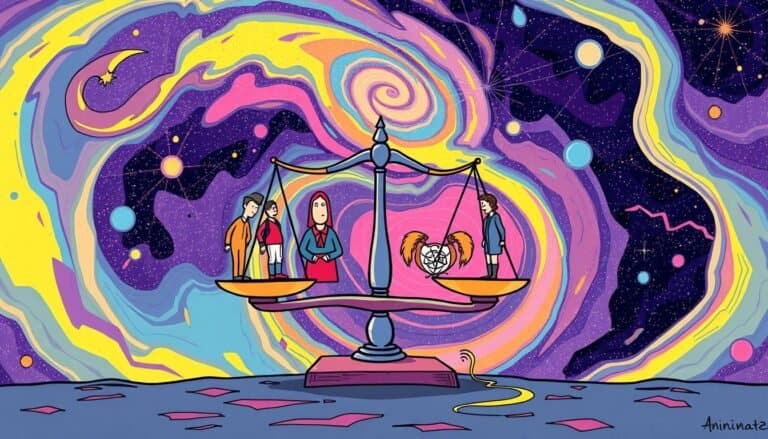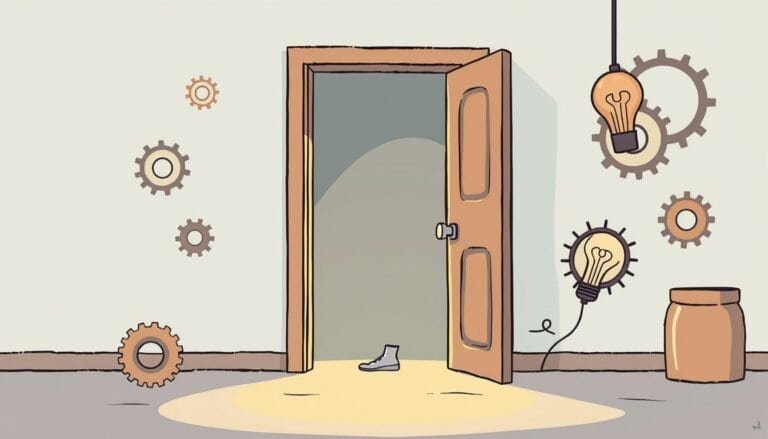Understanding Social Comparison Theory by Festinger
Ever felt jealous when you scroll through social media and see your friends’ success? This feeling ties into The Social Comparison Theory (Festinger). It says we often judge ourselves by comparing to others. This idea was first shared by psychologist Leon Festinger in 1954. It shows how important it is to see ourselves in relation to others when we make choices and judge ourselves.
This theory looks at how we compare in many ways, like skills, beliefs, and feelings. Researchers like Gibbons & Buunk (1999) and Schachter (1959) have studied this. Festinger believed we compare for many reasons, like to see how we stack up, to get better, or to feel good about ourselves. He came up with nine main ideas that help us understand why we do this.
He said our views of ourselves change based on who we’re with and what we see. He also pointed out that we usually feel more secure when we compare ourselves to others, not just ourselves. This shows how important it is to know the people we’re comparing to.
Key Takeaways
- Social Comparison Theory explores how individuals assess their self-worth by comparing with others.
- Festinger identified self-evaluation and social context as crucial elements influencing comparisons.
- The theory encompasses different motivations, including self-improvement and social bonding.
- Comparative evaluations can vary, relying on both subjective and objective metrics.
- Understanding group dynamics is vital as they shape our motivations and influences.
- Women often report higher tendencies for negative social comparisons linked to media portrayals.
Introduction to Social Comparison Theory
Social Comparison Theory was first introduced by Leon Festinger in 1954. It says that people naturally want to check their own thoughts and skills by comparing them to others. This idea helps us see how our sense of self changes based on the people around us.
There are two main ways people compare themselves to others: up and down. Upward comparison happens when we look at someone who seems better off than us. This can make us want to do better. Downward comparison is when we look at those who are worse off than us. This can make us feel better about ourselves.
Social comparison is a common part of our daily lives. It affects how we feel, what we do, and what we think about ourselves. It helps us understand where we stand in relation to others.
This theory can lead to different feelings. Looking up to someone who is doing better might make us feel jealous or sad. But looking down at someone who is doing worse might make us feel better about ourselves. The way we feel depends on how we think about what could have been.
Historical Context of Social Comparison Theory
The Social Comparison theory by Festinger started in 1954. It helps us understand how we judge ourselves by looking at others. Festinger’s work showed us how we learn about ourselves by watching and talking to others.
Over time, the historical development of social comparison theory grew. Early studies looked at how we compare our opinions and skills with others. They showed how these comparisons affect our actions and feelings.
Studies by Brewer and Weber in 1994 focused on how we see ourselves when comparing with others in groups. This helped us understand better how groups work.
Later, researchers looked at how social comparisons affect our feelings, happiness in marriage, and how we see ourselves. For example, Buunk and Ybema (2003) found that comparing ourselves to others can change how we feel and see our relationships.
Many studies have backed up the theory, showing it works in many social situations. They’ve shown how people are different in how they compare themselves to others. The theory has given us important insights into how we behave.
The Social Comparison Theory (Festinger)
Festinger’s social comparison theory helps us understand how we see our own worth and abilities. By looking at others, we learn more about ourselves. This happens a lot in our daily lives, especially with friends, the media, and social networks.
Definition and Overview
This theory says we naturally want to check our thoughts and skills against others’. This helps us get better and figure out what we want to achieve. It’s really important when we’re not sure about ourselves or when we’re competing with others.
Key Propositions from 1954
In 1954, Festinger shared some key ideas about social comparison. He found that we often compare ourselves to others when we’re unsure. This helps us judge ourselves and grow. It also affects how we act together in groups.
| Aspect | Description |
|---|---|
| Purpose | To assess personal value and abilities |
| Comparative Types | Upward and downward comparisons |
| Motivation | Influences aspiration and personal growth |
| Social Impact | Affects self-esteem, body image, and mental health |
With social networks getting bigger, understanding Festinger’s social comparison theory is key. People now have more chances and challenges to see how they stack up against others.
Understanding Upward and Downward Comparisons
Social comparison affects our thoughts, feelings, and actions in many areas of life. People often compare themselves to others to check their skills, beliefs, and self-worth. There are two main types of social comparison: upward and downward.
What is Upward Social Comparison?
Upward social comparison means looking up to those we see as better than us. It can push us to improve and aim higher. For some, it drives them to grow and set new goals. But for others, it can make them feel not good enough, leading to low self-esteem.
What is Downward Social Comparison?
Downward social comparison is the opposite, where we look down at those we see as less than us. It can make us feel better about ourselves and our achievements. It’s helpful when we’re facing tough times, making us feel superior. But too much of it can stop us from growing and make us less empathetic towards others.
The Psychological Mechanisms Behind Social Comparison
Social comparison helps us evaluate ourselves and seek validation. We often look at others to match our self-image with what society expects. This is key when we want to feel better about ourselves or find ways to improve. The Festinger comparison theory shows how we can compare up or down, depending on what we need.
When we compare up, we might feel not good enough because we see others doing better. But comparing down can make us feel better by showing us we’re doing okay compared to others. This back-and-forth affects how we see ourselves and motivates us.
- Upward Comparisons: Looking up to those who seem better can push us to grow, but it can also make us feel bad about ourselves.
- Downward Comparisons: Seeing others in tough spots can lift our spirits and make us feel better about our own lives.
Social media sites like Facebook and Instagram show how we compare ourselves today. In 2020, people in the U.S. spent a lot of time on these sites, showing how big a role social media plays in comparing ourselves to others. We use selfies and online chats to check how we stack up against others.
Studies link how much we compare ourselves online to our mental health. Spending too much time on social media can make us feel bad and lower our self-esteem. This highlights the need to understand how social comparison affects our daily lives and our mental health.
| Comparison Type | Impact on Self-Esteem | Examples |
|---|---|---|
| Upward Comparison | Can lower self-worth | Comparing achievements with a successful peer |
| Downward Comparison | Can boost self-esteem | Feeling better by comparing with someone less successful |
Impacts of Social Comparison on Self-Perception
Social comparison shapes how we see ourselves. It can make us feel good or bad. Knowing how it affects us can help us understand its impact on motivation, self-esteem, and mental health.
Positive Influences on Motivation and Self-Esteem
Some social comparisons can motivate us. Seeing others do better can push us to aim higher. This can make us more ambitious and drive us to grow.
Studying successful peers can boost our self-perception. It inspires us to improve our skills and abilities.
Negative Consequences: Dissatisfaction and Low Self-Esteem
But social comparison can also have downsides. Constantly comparing ourselves to others can make us feel not good enough. This can lead to feelings of inadequacy and dissatisfaction.
Research shows that too much comparison can make us feel envious and regretful. Those who often compare themselves to others are more likely to feel bad about themselves.
This can lead to defensiveness and blaming others. Feeling unhappy often comes from making too many comparisons. People who struggle to know who they are find it harder to see themselves positively.
| Aspect | Positive Influences | Negative Consequences |
|---|---|---|
| Motivation | Increased ambition from positive comparisons | Feelings of inadequacy from negative comparisons |
| Self-Esteem | Improved self-view through role models | Low self-esteem from constant upward evaluations |
| Emotional Responses | Excitement and hope for personal growth | Envy, regret, and dissatisfaction |
| Behavioral Outcomes | Enhanced effort towards goals | Defensiveness and social blaming behaviors |
Social Comparison in Modern Contexts: Social Media
Social media has become a big part of our lives, with over three billion people using it worldwide. It greatly affects how we see ourselves and our happiness. Studies show that too much social media can make us feel bad about ourselves, leading to depression and other mental health problems.
A study with 311 university students looked into how social media addiction affects self-esteem and feeling like you belong. It found that people who use social media a lot often compare themselves to others. This can make them feel worse about themselves. For example, comparing ourselves to others can make us feel better for a bit, but comparing up can make us feel not good enough.
Social media platforms are designed to make us want to show the best parts of our lives. This can make people feel bad when they can’t live up to these perfect images. In fact, most young people use sites like Instagram, Facebook, and TikTok, showing how widespread and harmful these platforms can be.
As social media keeps changing, we need to understand how it affects us. People often use it to feel accepted, but this can actually make things harder and make us feel alone. We need to find ways to use social media in a healthier way to avoid these problems.
Social Comparison Theory in Psychology
Social Comparison Theory was first introduced by Leon Festinger in 1954. It shows how we judge ourselves by looking at others. This idea is key to understanding mental health, especially how social comparison affects us.
Studies reveal that often comparing ourselves to others can make us feel anxious and depressed. This proves the big impact of social comparison on social comparison and mental health.
Implications for Mental Health
Comparing ourselves to others can really affect our well-being. Research shows that comparing up, or to those we see as better, can make us feel not good enough. On the flip side, comparing down might make us feel better for a bit, but it can also make us lazy.
This shows how important it is to understand the link between social comparison and mental health.
Role in Behavioral Strategies
Social comparison theory can guide us to better ways of seeing ourselves. By knowing we often compare badly, we can change. For instance, being kind to ourselves and comparing to those like us can help us feel better about ourselves.
Using strategies like this helps us focus on our own growth, not just how we stack up against others.
| Comparison Type | Impact on Mental Health | Behavioral Strategy |
|---|---|---|
| Upward Social Comparison | Increased anxiety, feelings of inadequacy | Focus on personal growth |
| Downward Social Comparison | Temporary boost in confidence, potential complacency | Cultivate gratitude and empathy |
| Peer Comparison | More stable self-assessments | Encourage collaboration and support |
Using these ideas in our daily lives can make us stronger and help us stay mentally healthy as we deal with social pressures.
Practical Examples of Social Comparison
Social comparison is a common behavior in many areas of life. People do this to check their skills, achievements, and value against others. This shows us how social comparison works in real life.
In school, students often look at their grades compared to others. Seeing others do worse might motivate them to study harder. But, seeing others do better can make them feel they’re doing great, which might not be true and can lead to bad study habits.
Sports are another great example of social comparison. Athletes always check their performance against others. Doing well against others can push them to train harder and compete better. But, seeing top athletes can make them feel not good enough, hurting their mental health.
When it comes to friends or partners, people often think about how their relationships stack up against others. A good relationship might make someone want to improve their own. But seeing less happy relationships might make them feel unhappy with their own.
These comparisons have big effects. Studies show that comparing ourselves to others online can make us feel bad and lower our self-esteem. Social media lets us constantly compare ourselves, which can change how we see ourselves.
| Domain | Type of Comparison | Potential Outcome |
|---|---|---|
| Academics | Upward Comparisons | Increased motivation for improvement |
| Sports | Downward Comparisons | False sense of achievement |
| Social Relationships | Upward Comparisons | Desire to enhance personal relationships |
| Social Media | Mixed Comparisons | Lower self-esteem and dissatisfaction |
These examples show how social comparison affects different parts of life. Knowing about these can help us understand our feelings and actions better. It shows how we see ourselves and others.
Strategies to Mitigate Harmful Effects of Social Comparison
Social comparison can make us feel envious, guilty, and unhappy. It’s important to find ways to lessen its negative impact on our mental health. Here are some good ways to do that:
- Fostering self-compassion: Treat yourself kindly, just as you would a friend in tough times. This helps you see yourself in a better light.
- Setting achievable personal benchmarks: Focus on your own progress, not others’. This builds a sense of achievement.
- Shifting focus to intrinsic rewards: Value growing as a person and doing things you love more than what others think. This lessens the need to compare.
- Practicing gratitude: Writing down things you’re thankful for can stop you from comparing yourself to others. It makes you happier.
- Encouraging mindfulness: Being mindful helps you notice when you’re comparing yourself to others. Then, you can change your thoughts.
Also, celebrating your own wins and defining success on your own terms makes you feel good without needing others’ approval. Studies show that women often compare themselves more, which can make them feel bad about themselves. Knowing this can help you choose healthier ways to compare, focusing on growing as a person.
| Strategy | Description | Benefits |
|---|---|---|
| Fostering Self-Compassion | Acting kindly towards oneself in times of difficulty. | Reduces self-criticism, promoting emotional healing. |
| Setting Personal Benchmarks | Establishing individual goals and measuring against them. | Encourages personal achievement and reduces harmful comparisons. |
| Shifting to Intrinsic Rewards | Valuing internal growth and personal development. | Enhances motivation and satisfaction without external influences. |
| Practicing Gratitude | Regularly acknowledging and appreciating positives in life. | Increases happiness and shifts focus away from comparisons. |
Learning and using these strategies can really help lessen the bad effects of social comparison. It makes you feel better emotionally and helps you see yourself in a positive way. Accepting yourself is key to staying strong against the urge to compare, especially with social media around.
Future Directions in Research on Social Comparison
Future studies on social comparison will look into how it changes with the digital world. Social media brings new challenges and chances to see how people compare themselves to others. This is especially true for different groups of people.
Researchers will focus on how culture affects how we see ourselves in comparison to others. They will look into how our cultural background changes our feelings and thoughts when we compare ourselves to others. This could help us understand why people react differently to comparing themselves up or down.
Another key area is how social media affects our mental health. Researchers might study how social media use changes our self-esteem and overall happiness. This could lead to new ways to help people deal with the bad effects of too much social comparison.
Researchers might also look into how feelings like empathy play a part in social comparison. Recent studies show that people feel differently about comparing themselves to others. This highlights the need to study the emotional side of these behaviors more deeply.
Conclusion
Leon Festinger introduced social comparison theory in 1954. It shows how people check their own abilities and opinions by looking at others. This process helps us see ourselves better and can make us feel better or worse, depending on who we compare to.
Understanding social comparison helps us see how we see ourselves and act. Our personality, what others think, and what our friends say affect how we compare. This idea is useful in many areas like health, school, and even life coaching.
It helps us grow or feel grateful, depending on who we look up to. Knowing about social comparison helps us deal with others better. It teaches us how to use comparisons to improve ourselves and deal with feelings like envy or regret.







